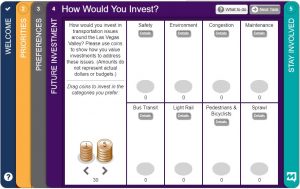Choosing the right online survey tool is one of several critical aspects to a successful survey. RVARC staff researched other cities, states, and MPOs to learn which survey tools other agencies are using and for what purposes.
RVARC staff considered several factors in evaluating online survey tools. Online survey tools generally have standard options such as multiple choice, select all that apply, short answer, and long answer. Some survey tools allow image-based questions or skip-logic depending on how the respondent answers a question. Some create mobile-friendly surveys or surveys that can be embedded in a website. Some survey tools limit the survey to a single page. An integrated map tool is an essential feature for transportation-related surveys.
SurveyMonkey is a standard among many agencies, and inexpensive. The RVARC has subscribed to SurveyMonkey for years.
Google Forms is a free option that is easy to use and integrate into a website or email.
MetroQuest surveys can get thousands of responses. MetroQuest specializes in public input for planning. MetroQuest developed a survey tool with the philosophy that public input should be a delightful experience.
Taking a MetroQuest survey is like playing a video game. Respondents drop virtual coins into different buckets representing road maintenance, transit, or sidewalks. They drag topics to the top of a list to indicate their priorities. They experiment with scenarios to modulate trade-offs among their priorities. They move pointers around on a map. MetroQuest is an excellent, though costly, survey tool.
Other survey tools that could be used for public input include PublicInput.com, Snap Surveys, Survey Act, Survey Gizmo, and SoGoSurvey. Tools for interactive forum discussions on individual projects include Mind Mixer, Peak Democracy, and Bang the Table.
You may see some of these tools employed in the next Long-Range Transportation Plan update.

